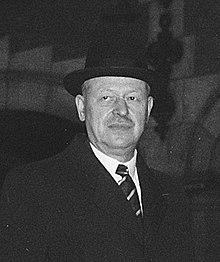Dupong-Bodson Ministry


The Dupong-Bodson Ministry was the government of Luxembourg between 3 July 1951 and 23 December 1953. It was a coalition between the Christian Social People's Party (CSV), and the Luxembourg Socialist Workers' Party (LSAP). It was formed after the general election of 1951.
Formation
[edit]In the partial elections of 3 June 1951, in the constituencies of Centre and Nord, the LSAP consolidated the positive results it had achieved in the election of 1948.[1] In the new Chamber of Deputies, it had grown from 15 to 19 seats, becoming the main competing force for the CSV (21 seats).[1] The Democratic Group lost a large number of votes in the Centre (19,7% in 1951, down from 25,9% in 1945), even though it managed to improve its result in Nord.[1] The result of the elections led the CSV to change its coalition partner. From 1951 to 1959, the government was formed by a coalition between the CSV and the LSAP.[1] These two political groups, which dominated political life for a decade, represented the two main areas of Luxembourgish society in the 1950s: the rural world and the workers' world.[1]
Foreign policy
[edit]After the signature of the Treaty of Paris on 18 April 1951, creating the European Coal and Steel Community, the question of the location of the new institution arose.[2] From 23 to 25 July 1952, the foreign ministers of the six member states met in Paris to find a solution.[2] Several cities including Luxembourg advanced their candidature, with none of them receiving unanimous support.[2] The High Authority and the Court of Justice were in danger of not being able to start their work, due to not having a headquarters.[2] During this impasse, the Luxembourgish Minister of Foreign Affairs, Joseph Bech, probably inspired by Konrad Adenauer, undertook a diplomatic manoeuvre that determined the European future of the Grand Duchy.[2] Bech withdrew the candidacy of Luxembourg, and then suggested the country's capital as a provisional place of work.[2] The other countries accepted this solution, which postponed the decision over the definitive headquarters of the European institutions to an undefined future date.[2] On 10 August 1952, the High Authority had its first meeting in the city hall in Luxembourg, presided by Jean Monnet.[2]
At the same time as Luxembourg was integrating itself in the ECSC, the government was confronted with another European project, that of the European Defence Community (EDC) which was to provide a framework for Germany's rearmament.[3] In the course of the negotiations, the government succeeded in gaining full representation for Luxembourg: one of the nine commissioners in the EDC would be Luxembourgish.[3] However, the country's small population did not allow it to fulfil its military obligations.[3] Again, the government managed to obtain special treatment for the case of Luxembourg.[3] On 27 May 1952, the treaty establishing the EDC was signed in Paris.[3] The treaty was never to come into effect, as the French National Assembly refused to ratify the EDC in 1954.[3]
Domestic policy
[edit]Since the introduction of obligatory military service in 1944, the Luxembourg Army had been much criticised for its lack of military value, and high financial cost, for such a small country.[4] The law of 23 July 1952 reorganised the Army, limiting the length of service to 12 months, with two recalls for three months each.[4] It was intended to allow Luxembourg to fulfil its military obligations to the EDC.[4]
After the elections of 1951, Pierre Dupong took over the Ministry of Agriculture in order to defuse the conflict between the Farmers' Central (Centrale paysanne) and the government.[4] He largely followed the protectionist position promoted by the farmers' professional association.[4]
Under the impulse of the CSV, the government gave the family a central role.[4] When the government was formed, it created a Department of Population and Family, which was attached to the Ministry of Education.[4] From 1952, a Superior Council of the Family assisted the minister in forming family policy.[4]
Victor Bodson, who was in charge of Transport, started an ambitious programme to modernise the railways.[4] This provided for a replacement of the narrow-gauge lines, and for a study on the electrification of the railway network.[4]
The Dupong-Bodson government also laid important groundwork in the area of social security.[4] Health insurance, which was already obligatory for manual workers, was extended to civil servants and employees (law of 29 August 1951).[4] From 1951, the minimum wage and employees' and workers' pensions were indexed, that is, adapted to inflation.[4]
Ministers
[edit]| Name | Party | Office | |
|---|---|---|---|
| Pierre Dupong | CSV | Prime Minister Minister for Finances Minister for Agriculture Minister for War Damage | |
| Joseph Bech | CSV | Minister for Foreign Affairs and Foreign Trade Minister for the Armed Forces | |
| Pierre Frieden | CSV | Minister for National Education Minister for Population and the Family Minister for the Interior Minister for Public Health Minister for Religion, the Arts, and Science | |
| Victor Bodson | LSAP | Minister for Justice Minister for Public Works Minister for Transport | |
| Nicolas Biever | LSAP | Minister for Work, Social Security, Mines, and Social Assistance | |
| Michel Rasquin | LSAP | Minister for Economic Affairs and Reconstruction | |
| Source: Service Information et Presse | |||
Further reading
[edit]- Thewes, Guy (2011). Les gouvernements du Grand-Duché de Luxembourg depuis 1848 (PDF) (in French). Service Information et Presse. ISBN 978-2-87999-212-9. Archived from the original (PDF) on 2017-01-11. Retrieved 2016-01-03.
